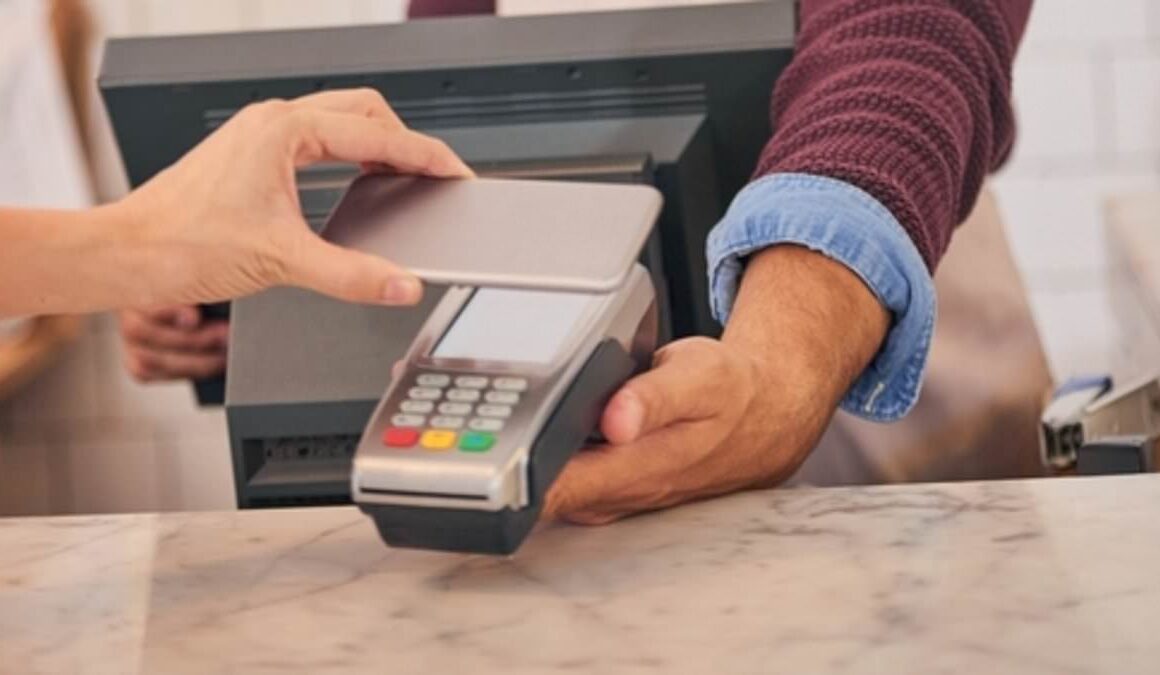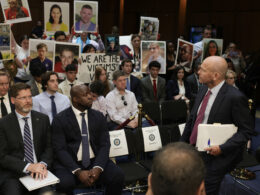As I seldom hit the shops till about four in the afternoon, I escaped lightly last Friday, when the CrowdStrike fiasco briefly marmalised modern life as we know it.
If my computer had crashed in the small hours, it had fast and fully recovered; I was not queueing in an airport, and the requisites for my tea that evening were purchased contactless and without incident.
The one casualty was my bookmarked link for my online subscription to The Spectator, which has since flatly refused to work: I have to scrabble to the site by Google Search instead, which feels frightfully 2001.
But Friday’s brief debacle is an unsettling, and indeed rather chilling, reminder how deeply we have now stumbled into a cashless society, and with all that entails.

Friday’s Crowdstrike debacle was an unsettling reminder of the perils of a cashless society
It’s ker-ching for the banks, which get to levy a little fee on every debit-card transaction. Joy unconfined for the Treasury – it has become far harder for small enterprises to evade VAT – and tears before bedtime for our honest old-fashioned criminals.
The traditional pay-day wages heist is, for them, the stuff of nostalgia; and feats such as the Great Train Robbery now seem amusingly analogue.
A huge cultural shift has happened really rather quickly. As recently as 1980, 50% of British adults did not have a bank account.
It is still not twenty years since Switch was gathered unto his fathers, and his son Chip-and-PIN reigned in his stead.
It was only in 2007 that contactless payment strolled nervously in, and 2020 and at the height of you-know-what before its limit was raised first to £45 and, in swift course, to £100.
And I am struggling to recall when last I had to write a cheque: it was probably to the piano-tuner, around 2016.
Covid – and certainly its early mythology, that it was largely spread by touch – certainly rocket-boostered our rapid slide from the wallet, the purse, and pockets jangling manfully with loose change.
All those coins and banknotes handled by who knows how many people? Ewwww. By 2021, only 15% of all British transactions were in cash, though it has since rallied a little with the cost of living crisis.
And quite a few businesses – like one posh Morningside bakery of my acquaintance – from 2020 refused to take cash payments at all.
Contrary to another widespread myth, no business is obliged to: only in the very narrow legal context, the settlement of a debt, is there such a thing as ‘legal tender’ – and only then with Bank of England currency.
And last year the powers-that-be firmly spurned a petition that it be made illegal for shops to refuse payment in cash. ‘The Government does not plan to mandate cash acceptance.
‘While the Government recognises the ability to transact in cash remains important to millions of people across the UK, particularly those in vulnerable groups, it remains the choice of individual businesses as to whether to accept or decline any form of payment, including cash or card. This may be based on factors such as customer preference and cost…’
To add to the gaiety of nations, there are still some business here and there who refuse to take payment in anything but real, physical money.
Like the estimable Wm. Christie, a family butcher concern in Bruntsfield, Edinburgh now on its fifth generation of Christies and with all sorts of aggressively hand-scrawled messages of the ‘HAGGIS – FRESHLY SHOT’ variety in its windows.
In January 2022, Christies were even slammed as ‘psychopaths’ by enraged vegans after cheekily posting another. ‘Every day thousands of innocent plants are killed by vegetarians. Help end the violence. EAT MEAT.’
But proffer a Visa card or ApplePay for your pound of beef links, and Willie Christie might menacingly eye the cleaver.
There are good reasons, though, why it might be wise to use cash for most of our shopping.
To buy goods and services otherwise is immediately to forfeit much of your privacy.
Every online or contactless payment is immediately recorded, along with your physical whereabouts, and the police – for instance, and should you be of interest to them – can quickly ascertain where you are and what are you doing.
It is all very well to protest that the law-abiding have nothing to fear: you should dread a society where you have to prove you have nothing to fear.
The sheer physicality of cash teaches us from childhood the value of money, encourages budgeting, and restrains us from stumbling into debt.
Over a million British people – including many of our elderly, and the homeless – still deal in hard currency and, in a cashless order, would be unable to buy food.
And a totally cashless society – how the banks would love it – would enable them to charge negative interest-rates, levying a monthly toll on you for looking after your savings.
There are still situations where I would be profoundly uneasy with digital transactions. I always tip waiters in cash: I am not at all certain, otherwise, they would actually get the money.
Dropping a note into the collection at church – the late Queen always had a crisp tenner in her handbag for this purpose – is an act of worship; waving your card or mobile at some device is but impersonal banality.
You can hardly ask a busker for his BACS details – and slipping a £20 note inside some youngling’s birthday card feels much nicer than the vulgarity of, say, an Amazon gift-voucher.
I dread the Big Brotherness of the alternative. Most of us have had the maddening experience of the bank calling us up and – after minutes we will never recover ascertaining we are actually who we are – querying some recent purchase.
‘I’ve been buying up ice at various petrol stations around Shrewsbury,’ snapped one irate journalist in 2022: he was preparing to entertain guests at a barbecue. ‘Is there a problem?’
And, whether you like him or not, there was something infinitely chilling about Nigel Farage’s ordeal at the hands of Coutts Bank a year ago.
Not merely did they try to shut his account down because his views were ‘at odds with our position as an inclusive organisation’ – an internal memo noted (hold the front page) his enthusiasm for Brexit and his friendship with vaccine-declining Novak Djokovic – but Dame Alison Rose, the ultimate CEO, smeared Farage behind his back to a BBC journalist at a cosy gala dinner.
She duly fell, and Farage’s account was restored.
‘I hope the whole financial sector learns from this incident,’ stormed Andrew Griffith, then City minister. ‘Its role is to serve customers well and fairly – not to tell them how or what to think.’
‘Take cash out of the equation entirely,’ mused Jake Wallis Simons, ‘and the vast data pool that maps the spending habits and personal affairs of every citizen will be complete.
‘This data, clearly, is hugely commercially valuable, and also of great use to government. How will it be used? How will it be sold? What draconian policies may it facilitate?’
We may be sleepwalking into an era when the State could, almost casually, cancel you.
And given the volatility of our times and its politics, we should not complacently assume that the State will always be benign.








